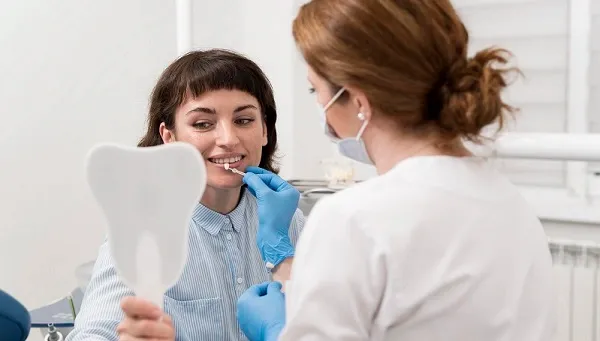Adult Orthodontics and Self-Esteem
For many adults, the thought of wearing braces or other orthodontic appliances can be daunting, especially if they've never had the opportunity to correct their teeth in their younger years. However, the benefits of adult orthodontic treatment are about more than just improving the appearance of your teeth. Correcting misaligned teeth or bite issues can positively impact your self-esteem. This post will explore how adult orthodontics can boost your confidence and help you achieve a smile you'll be proud to show off.
Impact of Smile on Self-Esteem
“A smile is not merely a physical feature.” It's a powerful tool influencing how we perceive ourselves and others. The alignment and appearance of our teeth play a role in shaping our self-esteem and confidence.
- Psychological Effects of Misaligned Teeth: Research consistently shows that individuals with misaligned teeth often experience lower self-esteem than those with straight teeth. This dissatisfaction with one's smile can have far-reaching effects on various aspects of life.
- Social Interactions: Feeling self-conscious about one's smile can lead to avoidance of social situations, reluctance to smile or laugh openly, and even withdrawal from social interactions altogether. Individuals may feel embarrassed or ashamed, fearing judgment or ridicule from others.
- Romantic Relationships: The perception of attractiveness is closely tied to the appearance of one's smile. Individuals with misaligned teeth may feel less confident in romantic situations, leading to hesitancy in pursuing relationships or diminished satisfaction in existing ones.

- Professional Opportunities: A confident smile can significantly impact one's success in the professional realm. Studies suggest that individuals with attractive smiles are perceived as more competent, trustworthy, and successful. Conversely, those self-conscious about their smile may experience barriers to career advancement or face discrimination in the workplace.
- Research Findings: Studies have found a strong correlation between dental dissatisfaction and lower self-esteem. For example, research published in the Journal of Orthodontics demonstrated that adolescents with malocclusion reported lower self-esteem compared to those with normal occlusion.
- Personal Anecdotes: Personal stories further highlight the profound impact of misaligned teeth on self-esteem. Many individuals recall instances of being teased or bullied because of their dental imperfections, leading to lasting emotional distress and insecurity.
The psychological effects of having misaligned teeth on self-esteem are significant and multifaceted. Recognizing the importance of a confident smile in fostering self-esteem underscores the value of seeking orthodontic treatment to address dental imperfections and regain confidence in one's appearance. By investing in orthodontic care, individuals can improve their dental health, overall well-being, and quality of life.
Boosting Self-Esteem Through Orthodontics
Orthodontic treatment offers more than just straightening teeth; it provides an opportunity to boost self-esteem and confidence. This section explores how orthodontics can positively impact self-esteem and well-being.
- Enhancing Facial Aesthetics: One of the primary ways orthodontics boosts self-esteem is by enhancing facial aesthetics. Straightening misaligned teeth can improve the smile's overall appearance, leading to greater confidence in one's appearance and a more positive self-image.
- Improving Smile Confidence: Orthodontic treatment can also enhance smile confidence. Individuals feel more comfortable smiling and speaking publicly by correcting dental imperfections such as crooked teeth, gaps, or overbites. This newfound confidence can positively impact social interactions and overall quality of life.
- Changing Self-Perception: Undergoing orthodontic treatment can lead to a shift in self-perception. As individuals see the transformation of their smile over time, they often experience a boost in self-esteem and a greater sense of self-worth. This can translate into increased confidence in various areas of life, from personal relationships to professional endeavors.
- Reducing Social Anxiety: Many individuals with misaligned teeth experience social anxiety related to their smiles. They may feel self-conscious or embarrassed in social situations, leading to avoidance behaviors. Orthodontic treatment addresses these concerns, allowing individuals to feel more comfortable and confident in social settings.
- Empowering Personal Growth: Orthodontic treatment is not just about straightening teeth; it's about empowering personal growth. By taking proactive steps to improve their smile, individuals demonstrate a commitment to self-care and self-improvement. This sense of empowerment can ripple effect, boosting confidence and encouraging further personal development.
- Celebrating Progress: Individuals celebrate milestones throughout the orthodontic journey, such as removing or adjusting braces. Each step forward reinforces a sense of accomplishment and pride, further boosting self-esteem and motivation to maintain oral health.

Addressing Concerns and Myths About Orthodontic Treatment
Orthodontic treatment can solve your problems, improve oral health, and enhance self-esteem. However, many individuals harbor concerns and misconceptions about orthodontic care that may deter them from seeking treatment.
Myth: Orthodontic Treatment is Only for Adolescents
Contrary to popular belief, orthodontic treatment is not limited to adolescents. It is common for adults to undergo orthodontic treatment to fix teeth misalignment, bite issues, and other dental imperfections. With advancements in orthodontic technology, treatment options are available for individuals of all ages.
Concern: Orthodontic Treatment is Painful
While some discomfort may be experienced during certain stages of orthodontic treatment, modern orthodontic techniques have significantly reduced pain levels. Orthodontists employ gentle and gradual adjustments to minimize discomfort, and over-the-counter pain relievers can effectively manage any temporary discomfort.
Myth: Orthodontic Treatment Takes Too Long
The duration of orthodontic treatment depends on individual needs and treatment goals. Advancements in orthodontic technology have shortened treatment times considerably. Additionally, the long-term benefits of a straighter smile outweigh the temporary inconvenience of treatment.
Concern: Orthodontic Treatment is Expensive
Orthodontic treatment is an investment in long-term oral health and self-confidence. While the cost of treatment may seem daunting, many orthodontists offer flexible payment plans and financing options to make treatment more affordable. Additionally, the benefits of orthodontic treatment, such as improved oral function and enhanced self-esteem, far outweigh the initial cost.
Myth: Orthodontic Treatment is Only for Cosmetic Purposes
While orthodontic treatment can undoubtedly enhance the smile's appearance, its benefits extend beyond cosmetic purposes. Correcting misaligned teeth and bite issues can improve oral function, reduce the risk of dental problems such as cavities and gum disease, and alleviate jaw pain and discomfort. Orthodontic treatment is a holistic approach to improving oral health and overall well-being.
Concern: Orthodontic Treatment Will Affect My Lifestyle
Orthodontic treatment may require adjustments to daily routines, such as avoiding certain foods or practicing diligent oral hygiene. However, modern orthodontic options like clear aligners offer greater flexibility and convenience than traditional braces. With proper care and adherence to orthodontist recommendations, individuals can continue to enjoy their favorite activities throughout treatment.
Contact your Danville dentist, Dr. Hoss Abar, DDS, MSD, at Danville Orthodontics to learn more about Adult Orthodontics and Self-Esteem.
Resource:
Introduction to Adult Orthodontics
*Neither this nor any other content in this media is meant to prescribe, recommend, or prevent any treatment or procedure. We highly suggest that you get the advice of a qualified dentist or other medical practitioners regarding your specific dental condition.
